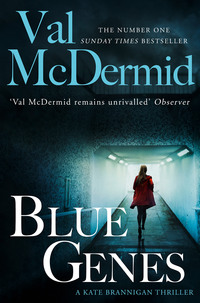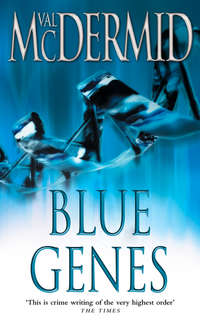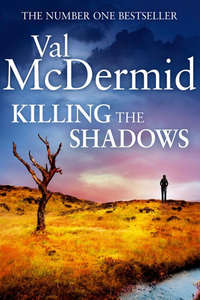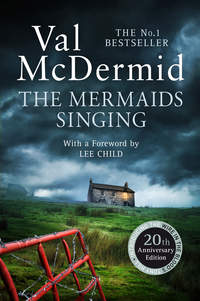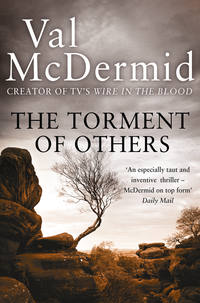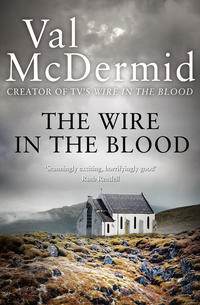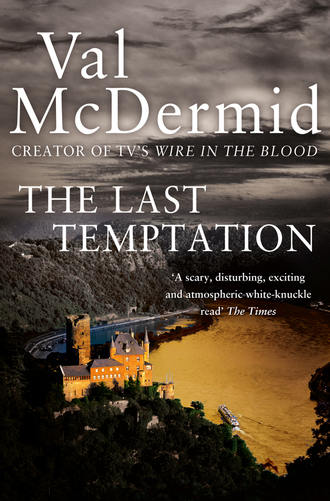
Полная версия
The Last Temptation
What the hell was going on? Why were they talking to Bishop about her? He had never been her commanding officer. She’d resisted a transfer to the nascent profiling task force, principally because it was Tony’s personal fiefdom and she had wanted to avoid working closely with him for a second time. But in spite of her best intentions, she’d been sucked into an investigation that should never have needed to happen, and in the process had broken rules and crossed boundaries that she didn’t want to think too closely about. She certainly didn’t want the interviewers who were considering her for a senior analyst’s post to be confronted by Paul Bishop’s dissection of her past conduct. He’d never liked her, and as Carol had been the most senior officer involved in the capture of Britain’s highest profile serial killer, he’d reserved most of his anger about the maverick operation for her.
She supposed she’d have done the same in his shoes. But that didn’t make her feel any happier with the notion that Paul Bishop had just walked into the room where her future was being decided. All of a sudden, Carol had lost her appetite.
‘We were right. She’s perfect,’ Morgan said, tapping his pencil end to end on his pad, a measured gesture that emphasized the status he believed he held among his fellow officers.
Thorson frowned. She was all too aware of how many things could go wrong when unfathomable emotions were dragged into play in an operation. ‘What makes you think she’s got what it takes?’
Morgan shrugged. ‘We won’t know for sure till we see her in action. But I’m telling you, we couldn’t have found a better match if we’d gone looking.’ He pushed his shirtsleeves up over his muscular forearms in a businesslike way.
There was a knock at the door. Surtees got up and opened it to admit Commander Paul Bishop. His colleagues didn’t even glance up from their intense discussion.
‘Just as well. We’d have looked bloody stupid if we’d come this far and then had to admit we didn’t have a credible operative. But it’s still very dangerous,’ Thorson said.
Surtees gestured to Bishop that he should take the chair Carol had recently vacated. He sat, pinching the creases in his trousers between finger and thumb to free them from his knees.
‘She’s been in dangerous places before. Let’s not forget the Jacko Vance business,’ Morgan reminded Thorson, his jaw jutting stubbornly.
‘Colleagues, Commander Bishop is here,’ Surtees said forcibly.
Paul Bishop cleared his throat. ‘Since you’ve brought it up … If I could just say something about the Vance operation?’
Morgan nodded. ‘Sorry, Commander, I didn’t mean to be so rude. Tell us what you remember. That’s why we asked you to come along.’
Bishop inclined his handsome head gracefully. ‘When an operation is perceived as having reached a successful conclusion, it’s easy to sweep under the carpet all the things that went wrong. But by any objective analysis, the pursuit and ultimate capture of Jacko Vance was a policing nightmare. I would have to characterize it as a renegade action. Frankly, it made the Dirty Dozen look like a well-disciplined fighting unit. It was unauthorized, it ran roughshod over police hierarchies, it crossed force boundaries with cavalier lack of respect, and it’s nothing short of a miracle that we managed to salvage such a favourable outcome. If Carol Jordan had been one of my officers, she would have faced an internal inquiry and I have no doubt that she would have been demoted. I’ve never understood why John Brandon failed to discipline her.’ He leaned back in his chair, his heart warmed by the soft glow of righteous revenge. Jordan and her bunch of vigilantes had cost him dear, and this was the first real chance he’d had for payback. It was a pleasure.
But to his surprise, the interview panel seemed singularly unimpressed. Morgan was actually smiling. ‘You’re saying that, when she’s in a tight corner, Jordan cuts through the crap and does her own thing? That she doesn’t have a problem showing initiative and dealing with the unexpected?’
Bishop frowned slightly. ‘That’s not quite how I would have put it. More that she seems to think the rules don’t necessarily apply to her.’
‘Did her actions endanger either herself or her fellow officers?’ Thorson asked.
Bishop shrugged elegantly. ‘It’s hard to say. To be honest, the officers involved were less than candid about some aspects of their investigation.’
Surtees, the third member of the panel, looked up, his pale face almost luminous in the fading afternoon light. ‘If I may summarize? Just to check we’re on the right track here? Vance hid behind the facade of his public celebrity as a television personality to murder at least eight teenage girls. His activities went entirely unsuspected by the authorities until a classroom exercise by the National Offender Profiling Task Force threw up a puzzling cluster of possibly connected cases. And still no one outside the group took the case seriously, even after one of their number was savagely killed. I’m right in saying that DCI Jordan had no involvement in the case until after Vance killed outside his target group? Until it was clear that unless some action was taken to stop him, he would almost certainly kill again?’
Bishop looked slightly uncomfortable. ‘That’s one way of putting it. But by the time she came on board, West Yorkshire were already investigating that case. They were taking appropriate measures and conducting a proper inquiry. If Jordan had wanted to make a contribution, that would have been the correct channel to go through.’
Morgan smiled again. ‘But it was Jordan and her motley crew that got the result,’ he said mildly. ‘Do you think Jordan displayed strength of character in the way she acted in the Jacko Vance investigation?’
Bishop raised his eyebrows. ‘There’s no doubt that she was stubborn.’
‘Tenacious,’ Morgan said.
‘I suppose.’
‘And courageous?’ Thorson interjected.
‘I’m not sure whether I’d characterize it as courage or bloodymindedness,’ Bishop said. ‘Look, why exactly have you asked me here? This isn’t normal procedure for appointing an NCIS officer, even at senior rank.’
Morgan said nothing. He studied his pencil on its rotating journey. Bishop hadn’t asked why he was here when he thought there was an opportunity for putting the shaft in on Jordan. It was only when he realized that he was talking to people who didn’t share his managerial view that he’d pushed for an answer. In Morgan’s book, that meant he didn’t deserve one.
Surtees bridged the gap. ‘We’re considering DCI Jordan for a very demanding role in a key operation. It’s highly confidential, so you’ll understand why we’re not able to provide you with details. But what you have told us has been very helpful.’
It was a dismissal. He couldn’t believe he’d been dragged across London for this. Bishop got to his feet. ‘If that’s all … ?’
‘Do her junior officers like her?’ Thorson caught him on the back foot.
‘Like her?’ Bishop seemed genuinely puzzled.
‘Would you say she has charm? Charisma?’ she persisted.
‘I couldn’t say from personal experience. But she certainly had my officers on the profiling task force eating out of her hand. They followed where she led them.’ Now the edge of bitterness was impossible to disguise. ‘Whatever feminine wiles she used, it was enough to get them to forget their training, forget their loyalties and chase off all over the country at her bidding.’
‘Thank you, Commander. You’ve been very helpful,’ Surtees said. The panel sat in silence while Bishop left the room.
Morgan shook his head, grinning. ‘She really got under his skin, didn’t she?’
‘But we learned what we needed to know. She’s got guts, she shows initiative and she can charm the birds off the trees.’ Surtees was scribbling notes on his pad. ‘And she’s not afraid to confront danger head-on.’
‘But nothing like this. We’d have to cover her back in ways we’ve never considered before. For example, she couldn’t be wired. We couldn’t risk that. So any product is going to be compromised for lack of corroboration,’ Thorson objected.
Surtees shrugged. ‘She has an eidetic memory for aural stimulus. It’s in the notes. She’s been independently tested. Anything she’s heard, she can recall verbatim. Her reports are probably going to be even more accurate than the muffled crap we get from half the surveillances we mount.’
Morgan smiled triumphantly. ‘Like I said, she’s perfect. The target won’t be able to resist.’
Thorson pursed her lips. ‘For all our sakes, I hope not. But before we make a final decision, I want to see her in action. Agreed?’
The two men looked at each other. Morgan nodded. ‘Agreed. Let’s see how she performs under pressure.’
3
The sun was slanting at an awkward angle as Tony Hill drove up the long hill out of St Andrews. He pulled the sun visor down and glanced in the rear-view mirror. Behind him, the green of the Tentsmuir Forest contrasted with the blue sparkle of the Firth of Tay and the North Sea beyond it. He glimpsed the jagged grey skyline of the town, ruins cheek by jowl with imposing nineteenth-century architecture, each indistinguishable from the other at this distance. It had become a familiar sight over the past eighteen months since he’d taken up his post as Reader in Behavioural Psychology at the university, but he still enjoyed the tranquillity of the view. Distance lent enchantment, turning the skeletons of St Regulus Tower and the cathedral into gothic Disney fantasies. Best of all, from a distance he didn’t have to deal with colleagues or students.
Although his professor had acted as if acquiring someone with his reputation had been a major enhancement of their departmental prospectus, Tony wasn’t sure he’d lived up to expectations. He’d always known he wasn’t really suited to the academic life. He was bad at politics, and lecturing still left him sweaty-palmed and panicky. But at the time he’d been offered the job, it had seemed a better option than continuing with work he no longer felt fit for. He’d started out as a clinical psychologist, working at the sharp end in a secure mental hospital, dealing with serial offenders. When the Home Office had started taking an interest in the effectiveness of offender profiling in police investigations, he’d been one of the obvious candidates to run the feasibility study.
It had helped his reputation almost as much as it had damaged his psyche that in the course of the study, he’d been directly caught up in the capture of a psychopathic killer who had been targeting young men. In the process, his own vulnerabilities had come close to destroying him. The degree of his involvement still gave him screaming nightmares from which he woke drenched in sweat, his body racked with echoes of past pain.
When the profiling task force was set up according to the recommendations he’d made, he’d been the inevitable choice to take charge of training a handpicked team of young police officers in psychological profiling techniques. It should have been a straightforward assignment, but it had turned into an excursion into hell for Tony and his charges. For a second time, he had been forced to confound the rules that said his should be an arm’s-length role. For a second time, he had ended up with blood on his hands. And the absolute certainty that he didn’t want to have to do any of it ever again.
His participation in the shadow world of offender profiling had cost him more than he cared to tot up. Two years later, and he was still never free of the past. Every day, when he went through the motions of a professional life he didn’t really believe in, he couldn’t help thinking of what he had walked away from. He’d been good at it, he knew. But in the end, that hadn’t been enough.
Impatient with himself, he ejected the Philip Glass cassette. Music gave him too much space for idle speculation. Words, that’s what he needed to divert him from his pointless introversion. He listened to the tail end of a discussion about the emergence of new viruses in sub-Saharan Africa, his eyes on the road that wound through the picturesque scenery of the East Neuk. As he turned off towards the fishing village of Cellardyke, the familiar pips announced the four o’clock news.
The comforting voice of the newsreader began the bulletin. ‘The convicted serial killer and former TV chat show host Jacko Vance has begun his appeal against conviction. Vance, who once held the British record for the javelin, was given a life sentence at his trial eighteen months ago for the murder of a police officer. The appeal is expected to last for two days.
‘Police appealed for calm in Northern Ireland tonight …’ The words continued, but Tony wasn’t listening any longer. One last hurdle and then it would finally be over. One more anxiety would, he hoped fervently, be laid to rest. Intellectually, he knew there was no chance of Vance’s appeal succeeding. But while it was pending, there would always be that niggle of uncertainty. He’d helped put Vance away, but the arrogant killer had always maintained he would find a loophole that would set him free. Tony hoped the road to freedom was only a figment of Vance’s imagination.
As the car wound down the hill towards the seafront cottage Tony had bought a year ago, he wondered if Carol knew about the appeal. He’d e-mail her tonight to make sure. Thank God for electronic communication. It avoided so many of the occasions for awkwardness that seemed to occur when they were face to face, or even talking on the phone. He was conscious of having failed Carol, and, in the process, himself. She was never far from his thoughts, but to tell her that would have been a kind of betrayal he couldn’t bring himself to perform.
Tony pulled up in the narrow street outside his cottage, parking the car half on the kerb. There was a light on in the living room. Once, such a sight would have set the cold hand of fear clutching his heart. But his world had changed in more ways than he could ever have dreamed of. Now, he wanted everything to stay the same; clear, manageable, boxed off.
It wasn’t perfect, not by a long way. But it was better than bearable. And for Tony, better than bearable was as good as it had ever been.
The throb of the engines soothed him, as it always had. Bad things had never happened to him on the water. For as long as he could remember, boats had protected him. There were rules of life on board, rules that had always been clear and simple, rules that existed for good and logical reasons. But even when he’d been too young to understand, when he’d inadvertently done things he shouldn’t have, the punishment had never descended on him until they went ashore. He’d known it was coming, but he had always managed to hold the fear at bay while the engines rumbled and the mingled smells of men’s unwashed bodies, stale cooking fat and diesel fumes filled his nostrils.
The pain had only ever been visited on him when they left their life on the water behind and returned to the stinking apartment by the fish docks in Hamburg where his grandfather demonstrated the power he held over the young boy in his care. While he was still staggering to recover his land legs, the punishments would begin.
Even now when he thought about it, the air in his lungs seemed to condense. His skin felt as if it were writhing over his flesh. For years, he’d tried not to think about it because it made him feel so fractured, so fragile. But slowly he had come to understand that this was no escape. It was merely a postponement. So now he made himself remember, almost treasuring the terrible physical sensations because they proved he was strong enough to defeat his past.
Small transgressions had meant he would be forced to crouch in a corner of the kitchen while his grandfather fried up a hash of sausage, onions and potatoes on the stove. It smelled better than anything the cook on the barge ever served up on the boat. He never knew if it tasted better, because when the time came to eat, he would have to wait in his corner and watch while his grandfather tucked into a steaming plate of fried food. Drenched in the appetizing aroma, his stomach would clench with hunger, his mouth become a reservoir of eager saliva.
The old man would gorge his meal like a hunting dog home in his kennel, his eyes sliding over to the boy in the corner with a contemptuous glare. When he finished, he would wipe his plate clean with a hunk of rye bread. Then he’d take out his bargee’s clasp knife and cut more bread into chunks. He’d take a can of dog food from the cupboard and tip it into a bowl, mixing the bread into the meat. Then he’d put the bowl in front of the boy. ‘You’re the son of a bitch. This is what you deserve until you start to learn how to behave like a man. I’ve had dogs that learned faster than you. I am your master, and you live your life as I tell you.’
Shaking with anxiety, the boy would have to get down on all fours and eat the food without touching it with his hands. He’d learned that the hard way too. Every time his hands came off the floor and moved towards dish or food, his grandfather would plant a steel-capped boot in his ribs. That was one lesson he’d taken to heart very quickly.
If his misdemeanours had been minor, he might be allowed to sleep on the camp bed in the hall between his grand-father’s bedroom and the squalid cold-water bathroom. But if he’d been judged unworthy of such luxury, he’d have to sleep on the kitchen floor on a filthy blanket that still smelled of the last dog his grandfather had owned, a bull terrier who’d suffered from incontinence for the last few days of its life. Cowering in a ball, he’d often been too scared to sleep, the demons of bewilderment keeping him edgy and uneasy.
If his unintentional sins had been on a more serious scale still, he would be made to spend the night standing in a corner of his grandfather’s bedroom, with the glare of a 150-watt bulb directed into his face in a narrow beam. The light that leaked into the room didn’t seem to bother his grandfather, who snored like a pig through the night. But if the boy sank exhausted to his knees or slumped in standing sleep against the wall, some sixth sense always woke the old man. After that had happened a couple of times, the boy had learned to force himself to stay awake. Anything to avoid a repetition of that excruciating pain in his groin.
If he had been judged as wantonly wicked, some childish game a contravention of protocol that he should have instinctively understood, then he’d face an even worse punishment. He would be sent to stand in the toilet bowl. Naked and shivering, he’d struggle to find a position that didn’t send shooting cramps up his legs. His grandfather would walk into the bathroom as if the boy were invisible, unbutton his trousers and empty his bladder in a stinking hot stream over his legs. He’d shake himself, then turn and walk out, never flushing after himself. The boy would have to balance himself, one foot in the bottom of the pan, soaking in the mixture of water and urine, the other bracing on the sloping side of the porcelain.
The first time it had happened, he had wanted to vomit. He didn’t think it could get any worse than this. But it did, of course. The next time his grandfather had come in, he’d dropped his trousers and sat down to empty his bowels. The boy was trapped, the edge of the seat cutting into the soft swell of his calves, his back pressed against the chill wall of the bathroom, his grandfather’s warm buttocks alien against his shins. The thin, acrid smell rose from the gaps between their flesh, making him gag. But still his grandfather behaved as if he were nothing more substantial than a phantom. He finished, wiped himself and walked out, leaving the boy to wallow in his sewage. The message was loud and clear. He was worthless.
In the morning, his grandfather would walk into the bathroom, run a tub of cold water, and, still ignoring the boy, he’d finally flush the toilet. Then, as if seeing his grandson for the first time, he would order him to clean his filthy flesh, picking him up bodily and throwing him into the bath.
It was no wonder that as soon as he’d been able to count, he’d measured off the hours until they returned to the barge. They were never ashore for more than three days, but when his grandfather was displeased with him, it could feel like three separate lifetimes of humiliation, discomfort and misery. Yet he never complained to any of the crewmen. He never realized there was anything to complain about. Isolated from other lives, he had no option but to believe that this was how everyone lived.
The understanding that his was not the only truth had come slowly. But when it came, it arrived with the force of a tidal wave, leaving him with a formless craving that hungered for satisfaction.
Only on the water did he ever feel calm. Here, he was in command, both of himself and the world around him. But it wasn’t enough. He knew there was more, and he wanted more. Before he could take his place in the world, he knew he had to escape the pall that his past threw over every single day. Other people seemed to manage happiness without trying. For most of his life, all he had known was the tight clamp of fear shutting out any other possibilities. Even when there was nothing concrete to cause trepidation, the faint flutter of anxiety was never far away.
Slowly, he was learning how to change that. He had a mission now. He didn’t know how long it would take him to complete. He wasn’t even sure how he would know he had completed it, except that he would probably be able to think about his childhood without shuddering like an overstrained engine block. But what he was doing was necessary, and it was possible. He had taken the first step on the journey. And already he felt better for it.
Now, as the boat ploughed up the Rhine towards the Dutch border, it was time to firm up the plans for the second stage. Alone in the cockpit, he reached for his cellphone and dialled a number in Leiden.
4
Carol looked at the three interviewers in blank incomprehension. ‘You want me to do a role-play for you?’ she said, trying not to sound as incredulous as she felt.
Morgan tugged the lobe of his ear. ‘I know it seems a little … unusual.’
Carol couldn’t stop her eyebrows rising. ‘I was under the impression that I was being interviewed for the job I applied for. Europol Liaison Officer with NCIS. Now, I’m not sure what’s going on.’
Thorson nodded understandingly. ‘I appreciate your confusion, Carol. But we need to evaluate your undercover capabilities.’
Morgan interrupted her. ‘We have an ongoing intelligence-gathering operation that crosses European frontiers. We believe you have a unique contribution to make to that operation. But we need to be sure that you have what it takes to carry it through. That you can walk in someone else’s shoes without tripping yourself up.’
Carol frowned. ‘I’m sorry, sir, but that doesn’t sound much like an ELO’s job to me. I thought my role would be essentially analytical, not operational.’
Morgan glanced at Surtees, who nodded and picked up the conversational baton. ‘Carol, there is no doubt in this room that you will make a terrific ELO. But in the process of dealing with your application, it’s become clear to all of us that there is something very specific that you and you alone can provide in the context of this single, complex operation. For that reason, we would like you to consider undertaking a day-long undercover role-play so we can observe your reactions under pressure. Whatever the outcome of that, I can promise that it will not adversely affect our decision about your fitness to join NCIS as an ELO.’
Carol swiftly processed what Surtees had said. It sounded to her as if they were saying the job was hers regardless. They were telling her she had nothing to lose by playing along with their eccentric suggestion. ‘What exactly are you asking me to do?’ she said, her face guarded, her voice neutral.
Thorson took the lead. ‘Tomorrow, you will receive a full brief on the role you are to assume. On the appointed day, you will go where you’ve been told and do your best to achieve the goals set out in your brief. You must remain in character from the moment you leave home until one of us tells you the role-play is over. Is that clear?’


